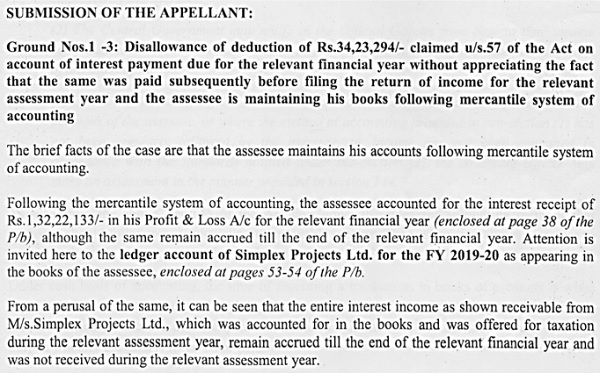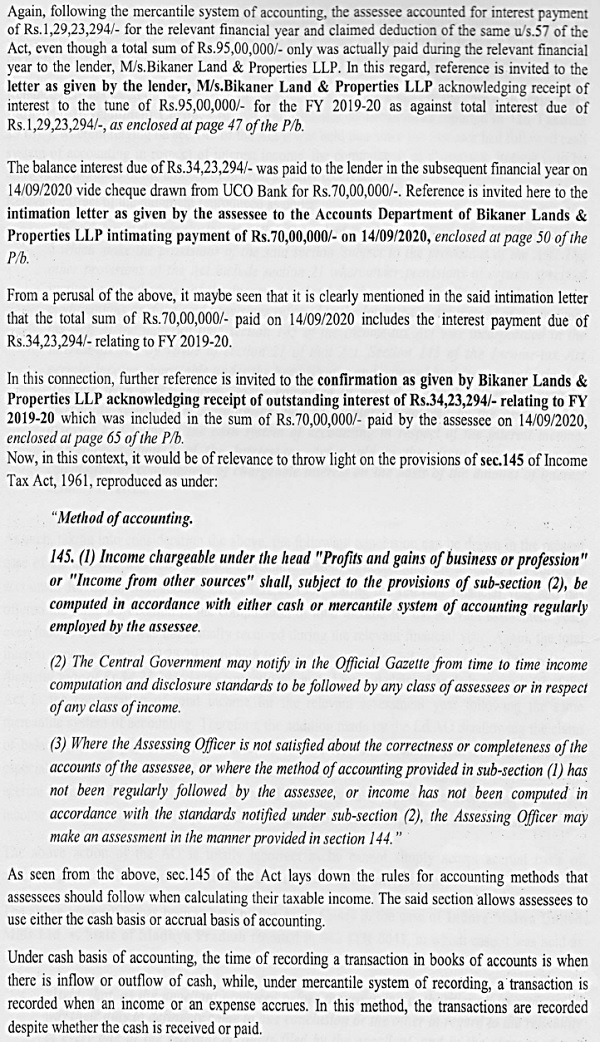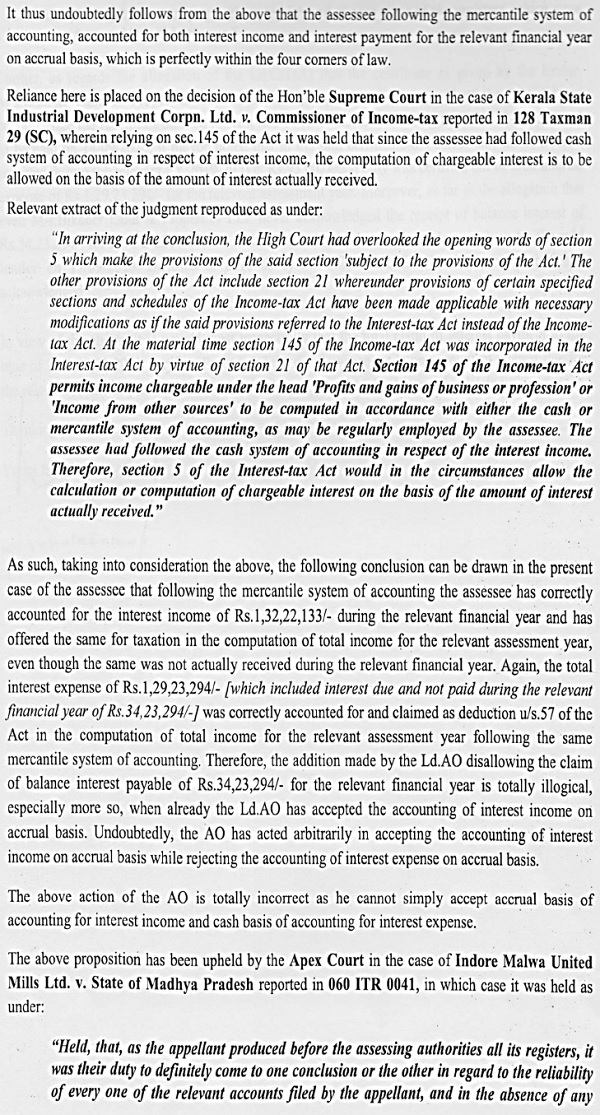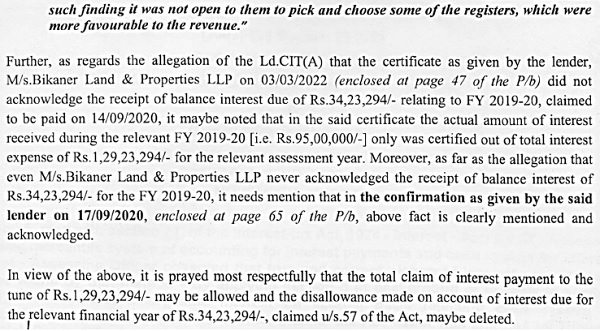Case Law Details
Bal Krishan Das Mundhra Vs ITO (ITAT Kolkata)
AO cannot mixed system of accounting for assessment of income on accrual basis and disallowance of expenditure on cash basis and Interest expense cannot be disallowed for not reflecting in Form 26AS issued by recipient.
The case of Bal Krishan Das Mundhra Vs ITO (ITAT Kolkata) revolves around the dispute regarding the assessment of income on accrual basis and the disallowance of expenditure on a cash basis. The appellant contested the disallowance of deduction under section 57 of the Income Tax Act, leading to a thorough examination of accounting practices.
The appellant, consistently following the mercantile system of accounting, recognized interest income on an accrual basis, despite not receiving the entire amount by the end of the accounting year. Similarly, interest expenditure was accounted for on accrual basis, with a portion paid in the subsequent year.
The Assessing Officer disallowed the interest expenditure discrepancy, contending that if expenditure isn’t reflected in Form 26AS issued by the recipient, it shouldn’t be allowed to the assessee. However, the Tribunal recognized the appellant’s adherence to the mercantile system and ruled in their favor.
Drawing upon the judgment of the Hon’ble Supreme Court in Kerala State Industrial Development Corporation Limited-vs.-CIT, the Tribunal emphasized the validity of accounting income on a mercantile basis and upheld the appellant’s claim.
FULL TEXT OF THE ORDER OF ITAT KOLKATA
The assessee is in appeal before the Tribunal against the order of ld. Commissioner of Income Tax (Appeals), National Faceless Appeal Centre (NFAC), Delhi dated 07.12.2023 passed for A.Y. 2020-21.
2. The assessee has taken five grounds of appeal, out of which Grounds No. 4 & 5 are general grounds, which do not call for recording of any specific finding.
3. In Grounds No. 1 to 3, only one common issue is involved, namely whether Revenue Authorities are justified in disallowing the deduction of Rs.34,23,294/- under section 57 of the Income Tax Act on the ground that assessee has not made the payment of interest expenses.
4. Brief facts of the case are that the assessee has filed its return of income on 30.12.2020 declaring total income of Rs.2,81,829/-. The case of the assessee was selected for scrutiny assessment and a notice under section 143(2) was issued and served upon the assessee.
5. On perusal of the accounts, it revealed to the ld. Assessing Officer that the assessee has shown interest income of Rs.1,32,22,133/- from Simplex Projects Limited. He also claimed interest expenditure of Rs.1,29,23,294/- as paid to Bikaner Land & Properties LLP. The ld. Assessing Officer further found that this interest expenditure has been claimed under section 57 of the Income Tax Act. He observed that on examination of Ledger Account of Bikaner Land & Properties LLP, it revealed that the assessee has actually paid interest of Rs.95,00,000/- only.
Therefore, he sought explanation of the assessee as to why the difference between the interest expenditure claimed by the assessee in the accounts, vis-à-vis actually paid should not be added back to the total income of the assessee. The assessee filed a detailed submission. However, ld. Assessing Officer was not satisfied with the submission of the assessee. He disallowed the interest expenditure of Rs.34,23,294/- and made the addition to the total income of the assessee. In this way, total income has been determined at Rs.37,05,123/-.
6. Appeal to the ld. CIT(Appeals) did not bring any relief to the assessee.
7. Counsel for the assessee while impugning the orders of Revenue Authorities has filed a detailed written submission and her submission reads as under:-

–

–

–

8. Apart from this, ld. Counsel for the assessee took us through the finding of ld. CIT(Appeals) in paragraph no.14 of the impugned order, which reads as under:-
“14. The appellant has relied on various case laws citing the claim of interest on accrual basis. However, the issue here is whether the remaining interest, which has been claimed u/s 57, was actually paid in next financial year or not. It is inferred that this certificate was given on 03.03.2022 and the alleged balance interest was shown to be paid on 14.09.2020. So, even the under Bikaner Lander and Property LLP did not acknowledge the receipt of balance interest of Rs.34,23,294/- for the F.Y. 2019-20 in this certificate, which proves that Rs.34,23,294/-, which is alleged to be interest component included in the UCO Bank cheque dated 14.09.2020 for Rs.70,00,000/-, is principal amount of loan taken in subsequent year but not the interest for previous year loan. Further, when previous two installments of interest payments were exclusively interest payment only, why this remaining interest would be clubbed with principal amount and that too in shown paid to in next financial year. Thus, the appellant failed to discharge the onus of conclusively proving the balance interest payment with any cogent evidence. Hence, the disallowance made by the AO of excess claim of said interest payment of Rs.34,23,294/- as deduction u/s 57, is sustained. Ground of appeal No. 1 of the appellant is dismissed”.
9. She submitted that the ld. CIT(Appeals) has misread the certificate exhibiting the payment of Rs.70,00,000/- on 14.09.2020. She took us through the details of this payment and submitted that a sum of Rs.70,00,000/- do include Rs.34,23,294/-, which is the component of interest. In other words, the stand of the ld. Counsel for the assessee was that the assessee has been following mercantile system of accounting. It has recognized interest income of Rs.1,32,22,133/- on accrual basis. Actually, this total amount was not received by the assessee before the end of the accounting year. Similarly, the assessee has recognized the interest expenditure on accrual basis out of the total amount accrued to it. It has actually paid Rs.95,00,000/- and the balance was paid on 14th September in the next year. The ld. CIT(Appeals) has erred in creating artificial distinction to the sum of Rs.70,00,000/- paid in the next year. This sum contains the interest component also. Therefore, according to the ld. Counsel for the assessee, there cannot be a mixed system of accounting for assessment of income on accrual basis and disallowance of expenditure on cash basis.
10. The ld. D.R., on the other hand, submitted that if expenditure is not reflected in Form 26AS issued by the recipient, then, how it will be allowed to the assessee.
11. We have duly considered the rival contentions and gone through the record carefully. There is no dispute with regard to the fact that the assessee has been consistently following mercantile system of accounting. It has accounted its interest income on mercantile system and not on receipt basis. This stand of the assessee was not disputed by the ld. Assessing Officer. We could appreciate the stand of the ld. Assessing Officer that if he excluded the interest income shown by the assessee to the extent, it was not received in this year by following cash system of accounting. Similarly, ld. Assessing Officer cannot disallow the expenditure worked out by the assessee on mercantile system of accountancy. The Hon’ble Supreme Court in the case of Kerala State Industrial Development Corporation Limited-vs. – CIT reported in 128 Taxman 29 (SC) relied upon by the ld. Counsel for the assessee has considered identical situation. Respectfully following the judgment of the Hon’ble Supreme Court relied upon by the ld. Counsel for the assessee, we allow this ground of appeal and delete the disallowance.
12. In the result, the appeal of the assessee is allowed.
Order pronounced in the open Court on 09/04/2024.





